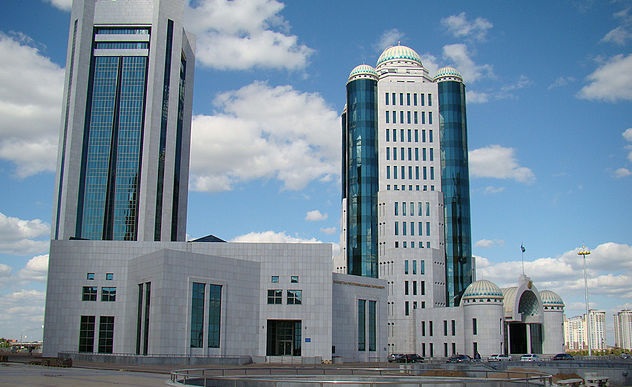Prime Minister could soon sign a law that bans evangelism and religious materials of unregistered groups. Protestants in several European countries send letters to embassies demanding religious freedom.
 he parliament buildings in Astana, Kazakhstan. / msykos (Flickr, Wikimedia Commons)
he parliament buildings in Astana, Kazakhstan. / msykos (Flickr, Wikimedia Commons)
The European Evangelical Alliance (EEA) is asking Christians across Europe to raise their voices in the defence of religious liberty in Kazakhstan.
According to a letter published by the body representing evangelical Christians in Europe, the Religion and Civil Society Ministry of Kazakhstan prepared a draft Amending Law which proposes changes to three Codes and nine Laws, including the 2011 Religion Law.
“The Muslim Board and the Metropolitan Region of the Russian Orthodox Church, are the only two organisations with the status of nationwide religious organisation”. These official two faith groups don’t have to re-register under the new Amending Law.
MORE RESTRICTIONS FOR PROTESTANTS
But “regional and local religious organisations that have failed to bring their statutes into line with the new provisions and have failed to gain re-registration will face liquidation”. Among them, the EEA said, are evangelical Christians.
Local sources are “extremely concerned about this Amending Law”. “When the 2011 Religion Law came into force, all religious organisations had to register anew as well”.
Most Protestants in the country are in a legal limbo since 2011. “Out of more than 1,300 Protestant organisations/churches, only 495 have been able to renew their legal status. All others went underground or just disappeared. This included many Kazakh speaking churches”.
PRIME MINISTER COULD SIGN LAW SOON
Now Prime Minister Bakytzhan Sagintayev is expected to approve the draft Law “soon”, according to what sources told Forum 18.
The text is to be sent to the lower house of Parliament, the Majilis. “Once the government has approved a draft Law, it can be swiftly adopted in Parliament and signed by the president”.
The new draft Law restricts religious freedom with new restrictions, including:
- Effective ban of religious teaching unless it takes place within registered places of worship or registered religious education establishments “in accordance with their statues”, or with the permission of the Regional authorities. This would among other things effectively ban religious discussions in in private homes (e.g. Bible study groups).
- What was left of an individual’s explicit right to “spread” religious beliefs without state permission is narrowed. Unregistered religious communities are explicitly banned sharing their beliefs.
- A new definition of “clergy”. They seem to be the (only) ones to conduct preaching. They require nomination by the leaders of a state-registered religious body. This would e.g. affect those religious communities which do not have a hierarchical structure. Further, it would reduce the number of people allowed to exercise leadership roles in a community’s worship.
- State religious censorship is strengthened and all religious materials are banned, including icons, if they have “received a negative religious expert conclusion”.
LETTERS TO AMBASSADORS
Italian evangelical Christians recently delivered a letter to the Kazakhstan embassy in Rome. It asked to stop “further limitations to the free expression of religion in Kazakhstan, placing thousands of citizens in a position of fragility and limiting access to one of the fundamental human freedoms: religious freedom”.
A letter has also been sent to the ambassador in Madrid (Spain). The Religious Freedom Work Group of the Spanish Evangelical Alliance asked the embassy to “intercede with its government to stop this draft Law, (...) a fairer law guarantees religious freedom to all citizens, no matter what faith they adhere to”.
Kazakhstan ranked 28th on Christian support organization Open Doors’ 2018 World Watch List of the countries where Christians experience the most persecution.

Las opiniones vertidas por nuestros colaboradores se realizan a nivel personal, pudiendo coincidir o no con la postura de la dirección de Protestante Digital.
Si quieres comentar o